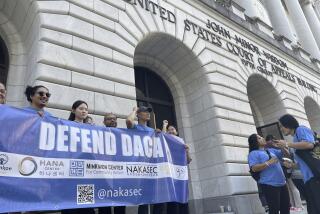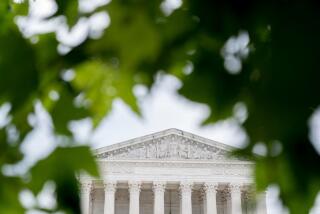Supreme Court begins debate on Defense of Marriage Act
- Share via
WASHINGTON — The Supreme Court has begun debating whether the 130,000 legally married gay couples in this country are entitled to the same benefits under federal law as heterosexual married couples.
The justices seemed reluctant Tuesday to rule that gays have a right to marry, but Wednesday’s oral arguments may indicate whether they are prepared to take smaller but significant steps in favor of legally married same-sex partners.
At issue is the part of the Defense of Marriage Act of 1996 that says the federal government will recognize only marriages between a man and a woman. As with Tuesday’s argument, the question is whether this provision denies gay and lesbian couples the “equal protection of the laws” promised by the Constitution.
PHOTOS: Supreme Court considers gay marriage
When the act, called DOMA, became law, no state permitted same-sex marriage. But beginning with Massachusetts in 2003, nine states and the District of Columbia now allow gays and lesbians to marry. Despite these changes in state laws, the married couples were not entitled to tax benefits, Social Security payments and other benefits that go to other married couples.
Last year, however, the U.S. appeals courts in Boston and New York agreed in separate decisions that the federal law unconstitutionally discriminated against married same-sex couples.
The Obama administration’s lawyers agree that DOMA is unconstitutional, and U.S. Solicitor Gen. Donald B. Verrilli Jr. will urge justices to invalidate it.
But Paul Clement, who was solicitor general during the George W. Bush administration, is arguing on behalf of the law. He is representing House Republicans who believe federal recognition should be limited to “traditional marriage.”
FULL COVERAGE: Battle over gay marriage
The justices have scheduled nearly two hours for the arguments. Nearly half the time will be devoted to a procedural question: whether Clement and House Republicans have standing to defend the law.
The case before the court was brought by Edith Windsor, a New York widow whose lifelong female partner and spouse died in 2009. Windsor was assessed $363,000 in federal estate taxes because the Internal Revenue Service did not recognize their marriage.
If the justices were to strike down DOMA, the ruling would be a major victory for gay rights and for thousands of legally married same-sex couples. But it would not necessarily have any effect in the 41 states that do not recognize such marriages.
Gay marriage through the years
Follow Politics Now on Twitter and Facebook
More to Read
Get the L.A. Times Politics newsletter
Deeply reported insights into legislation, politics and policy from Sacramento, Washington and beyond. In your inbox three times per week.
You may occasionally receive promotional content from the Los Angeles Times.











